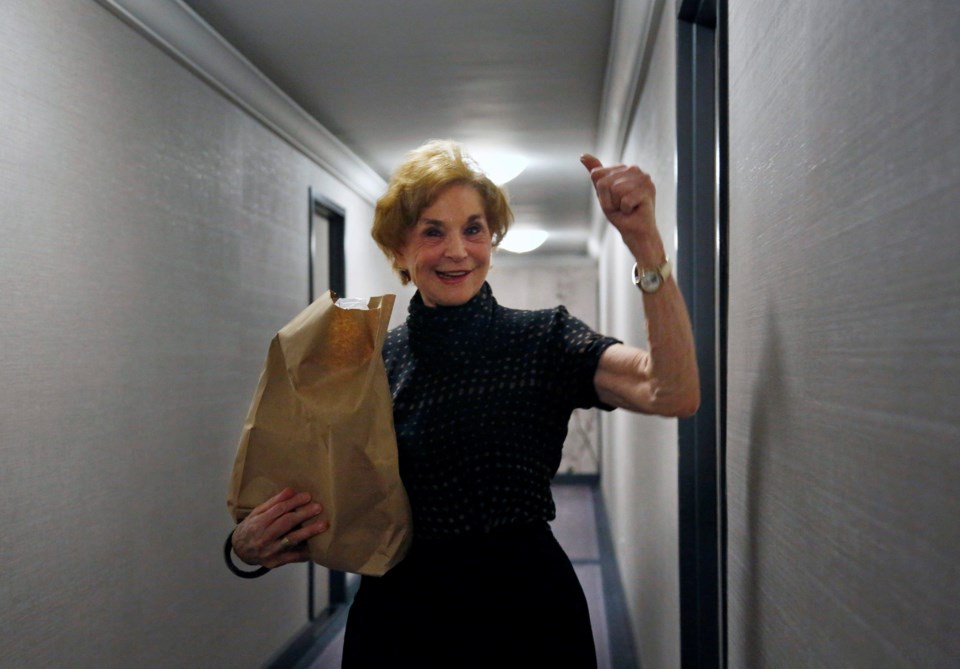NEW YORK — Liam Elkind's big heart and his break from college was a highlight of 83-year-old Carol Sterling's week.
The retired arts administrator has been sheltering at home during the coronavirus outbreak, unable to shop for herself. Yearning for some fresh food, she found the 20-year-old through their synagogue, and soon he showed up at her door with a bag full of salad fixings and oranges.
Elkind, a junior at Yale, and a friend, Simone Policano, amassed 1,300 volunteers in 72 hours to deliver groceries and medicine to older New Yorkers and other vulnerable people. They call themselves Invisible Hands, and they do something else in the process — provide human contact and comfort, at a safe distance, of course.
On delivery day Tuesday, Elkind and Sterling met for the first time over her paper bag of groceries outside her 15th-floor apartment on the Upper West Side. It was a moment of “tikkun olam” between the two congregants of the progressive and service-minded Stephen Wise Free Synagogue.
The Hebrew for “world repair” is a phrase synonymous with the notion of social action.
“It's
Elkind, the son of a doctor, has watched his father and other caregivers working tirelessly in crisis.
“I figured, OK, I can go buy some groceries. That I can do.”
Life has changed radically for Sterling, a widow who lives alone. She's a people person, a puppeteer who clearly misses human interaction as she busies herself at home with online classes through “something called Zoom, which I had never heard of.”
She was supposed to be in Vietnam and Bali attending a conference and teaching children and educators about puppetry. The outbreak dashed her plans. With her two children and other family far away, the usually busy Sterling has a new friend in Elkind.
“People are scared, and people are lonely,” he said. “We're all so separated, and one of the things we need is that social cohesiveness. This is one opportunity to get them that social connection they're looking for.”
For most people, the virus causes only mild or moderate symptoms, such as fever and cough. For some, especially older adults and people with existing health problems, it can cause more severe illness, including pneumonia. The vast majority of people recover.
Elkind and his fellow volunteers take the name of their project from their vigilance in maintaining social distance from the people they serve, and their meticulous care while shopping and delivering.
Grocery and pharmacy orders are placed on the Invisible Hands
They must pledge that they have practiced social distancing and other safety measures in their own lives before signing on. They wear gloves while shopping, wipe down bags they're delivering and use self-checkout when possible.
Bags of goods are left at doors, and cash can be exchanged the same way, or directly to a store or through a digital transaction. Volunteers make a point to pause and chat as they deliver.
The effort started on Facebook. Policano, also a New Yorker, put out a call for volunteers. Word spread quickly as they built a
“It's gone from extremely casual to extremely operational very quickly,” Elkind said. “This is one of those times when I remember that New York is such a small town, and people are willing to look out for one another and have each other's back.”
Now, Elkind said, volunteers have offered to extend Invisible Hands to Boston, Los Angeles, San Francisco, Washington and London.
“It's been really exciting just to see that amount of interest and how many people there are in this world who want to do good and are looking for ways to do that," he said. “This is a 24-7 operation right now. It's overwhelming in the best way possible.”
Elkind is on spring break at the moment. After that, his school goes to remote learning. Unless told by officials to stop, Invisible Hands will press on. It was unclear what would happen to the efforts if New York is put under a shelter-in-place order, as Mayor Bill de Blasio has proposed. Such a measure could force residents to stay home except for strictly limited activities like buying food or medicine or getting exercise.
Sterling was more than a little grateful, for the food and for Elkind and his colleagues of all ages.
“When we look back ... a lot of good things are going to come out of this," she said of the crisis. “This will bring everybody together.”
___
While nonstop global news about the effects of the coronavirus have become commonplace, so, too, are the stories about the kindness of strangers and individuals who have sacrificed for others. "One Good Thing" is a continuing AP series reflecting these acts of kindness.
___
The Associated Press receives support for health and science coverage from the Howard Hughes Medical Institute’s Department of Science Education. The AP is solely responsible for all content.
___
Associated Press religion coverage receives support from the Lilly Endowment through the Religion News Foundation. The AP is solely responsible for this content.
Leanne Italie And Jessie Wardarski, The Associated Press




